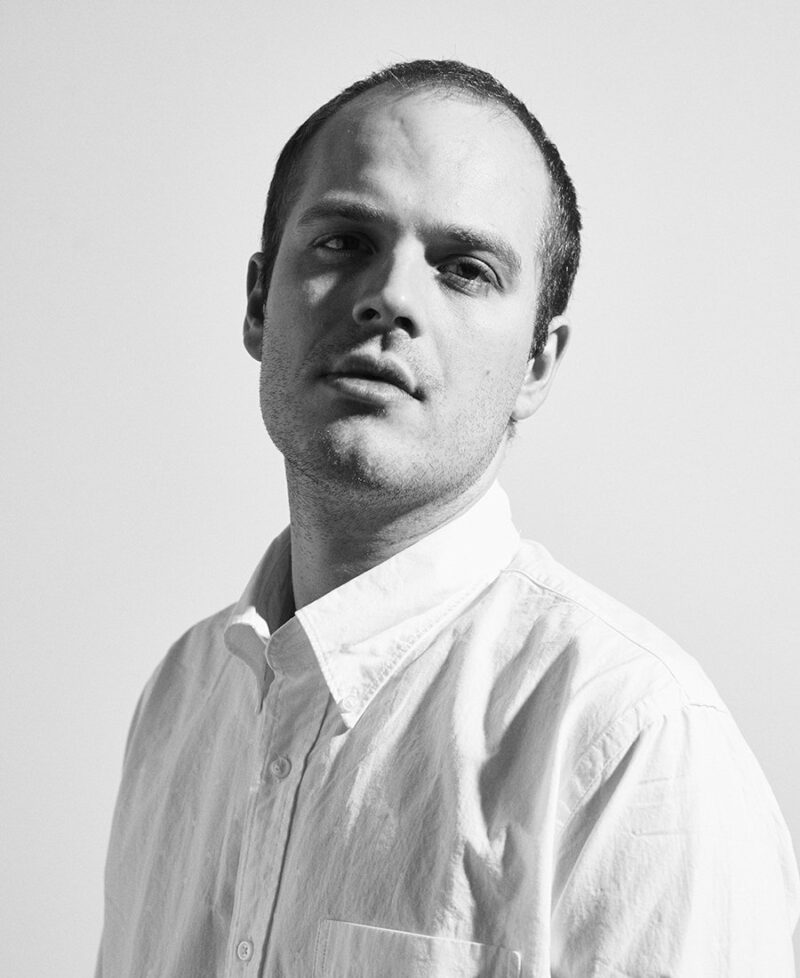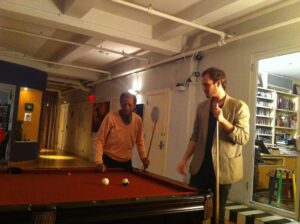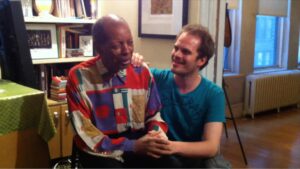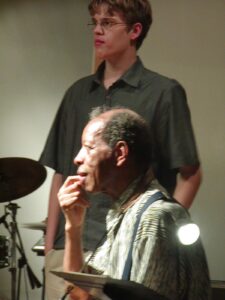#286 Casimir Liberski piano/synthesizer
ツアー直前 カジミール・リベルスキ piano/synthesizer
interviewed by Kenny Inaoka 稲岡邦彌 via Google Doc, July 2024
Casimir Liberski piano synthesizer
カジミール・リベルスキ
https://www.casimirliberski.com/
Part 1:Upcoming tour
Part 2:Activities
Part 3:History
パート1:
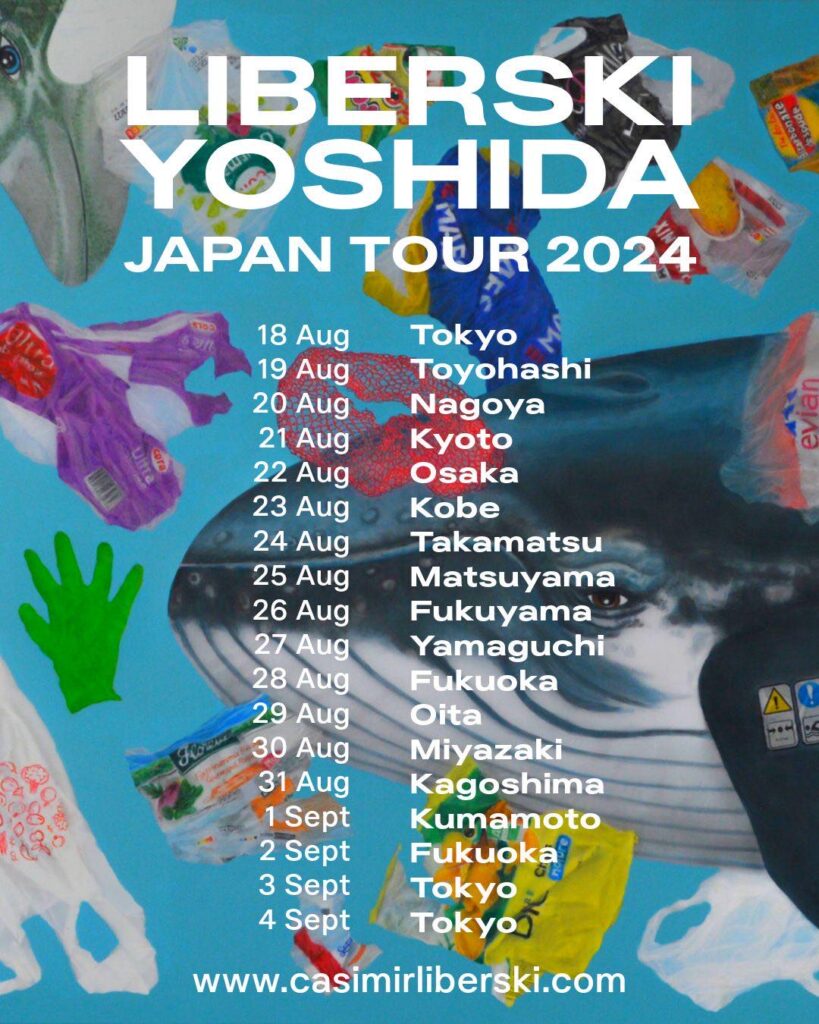 JazzTokyo: 日本ツアーは初めてですか?
JazzTokyo: 日本ツアーは初めてですか?
カジミール・リベルスキ: 正式にはそうです。これまでの旅行では東京のあちこちで小規模なライブを行ってきましたが、今回のツアーほどハイペースで演奏したことはありませんでした。
JT:今回は何回のライブが予定されていますか?
カジミール: 私の記憶が間違っていなければ、25 回くらいだと思います。
JT:ツアーはどのように企画されましたか?
カジミール:吉田達也がツアー全体を企画してくれました。とても感謝しています。
JT:ゲストはどのように選ばれたのですか?
カジミール: 達也が連絡を取ってくれて、僕も今までに出会ったミュージシャンやその作品を尊敬しているミュージシャンを何人か紹介しました。たとえば、ベース奏者の須川崇志とは長い付き合いで、何度も一緒に演奏しました。私たちがアメリカに住んでいた頃、私は彼を、後にタカシの指導者となる私の友人であり指導者でもある亡き菊地雅章に紹介しました。
大友良英には最近のツアー中にブリュッセルで初めて会い、ずっと共演してみたいと思っていたので、楽しみにしています。
JT:ピアノの他にキーボード(シンセサイザー)も弾くことになりますね。今回はどの楽器を持っていきますか?
カジミール: 旅行には大きなボードを持ち歩くことができません。そこで、無限のサウンドを収録したデスクトップ・シンセの新型Synclavier Regenを携帯することにしました。フランク・ザッパやマイケル・ジャクソンなどが使用したことで有名なニューイングランド・エレクトロニクスのシンクラビアの最新世代で多種多様なシンセシスを組み合わせています。この強力なマシンを使いこなすことにとても興奮しています。
JT:今回は即興演奏に加えて曲を演奏することを期待されています。それぞれ曲の準備はできているのですか?
カジミール:これまでのところ、デュオは完全な即興ショーのみを演奏していますが、私たちは作曲も演奏する計画がありました。私はこれまで録音したり、人のために演奏したりしたことのない曲をたくさん書いてきました。そこで、達也は時間をかけてその中から私たちに最も適していると思われるものをいくつか選んでくれました。最終的には達也の音楽も演奏したいと思っていますが(彼はとんでもない作曲家なので)、すでにたくさんの素材から選ぶことができます。
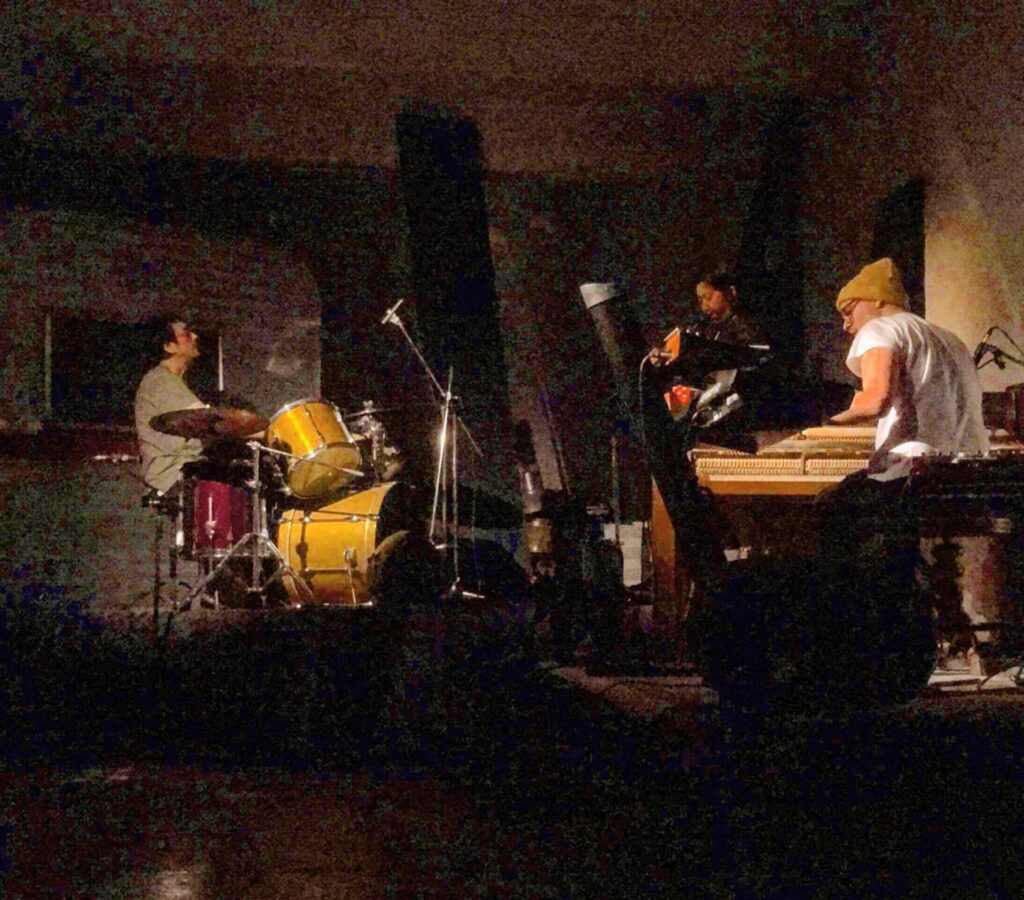
JT:吉田達也とはどのように知り合ったのですか?
カジミール:もちろん私は達也のことは彼の伝説的なバンド「ルインズ」で知っていました。十代の頃からすでにファンでした。ウォークマンでルインズのCDを流しながら中学校に入学したのを覚えています。私は、音楽とはパンクロック、プログレとジャズの複雑さ、そして私が好きな実験音楽を完璧に組み合わせたものだと考えていました。その後、彼が Facebook をやっていることが分かったので、単純に彼を追加して、ブリュッセルでショーを企画するために連絡を取ったのです。 2016年にサックス・ルインズ(アルトサックス奏者の小埜涼子とのデュオ)で共演し、私は彼らの前座を務め、セットの最後にはシットインさせてもらったのです。コロナ禍でも音楽を送り続け、ついに2023年2月に東京のバー・セロニアスでデュオ・ショーが実現し、それを達也がレコーディングし、後にブリュッセルを拠点とするレコード・レーベル「トータリズム」から『Troubled Water』としてリリースされたのです。
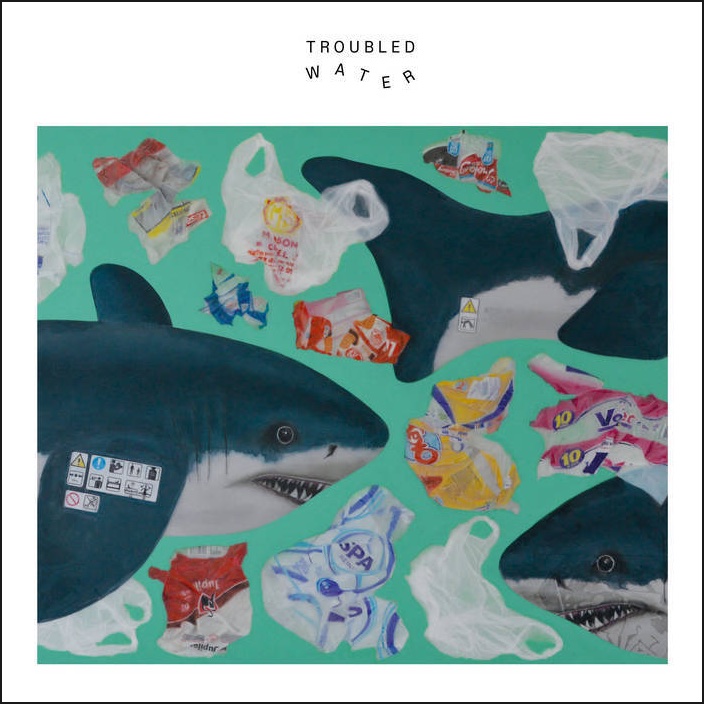 JT:アルバム『Troubled Water』は日本で生まれたのですね。
JT:アルバム『Troubled Water』は日本で生まれたのですね。
カジミール:このライブでのパフォーマンスは非常に特別なものだと思いました。その夜、私たちの演奏のエネルギーと創意工夫によって、まるで魔法のような何かが起こったかのようでした。そこでジョン・ゾーンに音楽を送ってみたところ、ツァディクのレコードをミキシングし、ビル・ラズウェルのライブ録音もよくミキシングしていたジェームス・デラコトマにミックスしてもらうよう勧めてくれたのです。
ジェームスは、ライブサウンドの生々しさを生かし、さらに非常に独創的で美しいものに仕上げるという素晴らしい仕事をしてくれたのです。それからブリュッセルに戻り、この新しいレーベルを立ち上げたばかりのTotalismの人たちに会ったのです。当初、彼らは主に出版を中心とし、たまたま父の最新小説を出版していたという縁です。
彼らはとても機動力に優れ、デザインに加えプレス(The Wire、Pitchfork、Record Makersなど)へも積極的にアプローチしてくれました
JT:CD やレコード盤はどこで製造したのですか?
カジミール: ベルギーかオランダだと思います。グラフィック・デザイナーはベルリンに拠点を置いています。
表紙のアートワークは、私の友人のベルギーのアーティスト、パスカル・ベルニエの絵です。
JT:Bandcamp 経由でアルバムをデジタルで購入することもできますか?
カジミール:はい。 LP はすべてのストリーミング ・プラットフォームでも聴取可能です。 CD「水、滾る」には、レコードの「Troubled Water」とはまったく異なるトラックリストが収録されています。これは、約 2 時間の音楽になるショー全体をミックスしてマスタリングしており、すべてをさまざまなフォーマットで共有したかったからです。
日本のツアーではCDだけになりますが、来月にはLPも入手できるようになると思います。
BandCamp
https://totalism.bandcamp.com/album/troubled-water
パート2:
JazzTokyo:最近主に使っている楽器は何ですか?
カジミール: ピアノです。そして私が生きている限りそうであってほしいと願っています。
JT:自宅にはピアノやさまざまなキーボード/シンセサイザーが設置されていますか?
カジミール: はい、幸い私は現在、ヤマハのベビーグランドピアノ、ミキシングボード、すべてのシンセサイザー (Prophet 10、MiniMoog、DX7、3rd Wave、OBX8…など) を備えた素敵なホームスタジオをブリュッセルに持っています。
JT:あなたの国で主に活動する場所はどこですか?
カジミール:ブリュッセルだと思います。なぜなら、私は今そこに住んでいて首都なのですが、思うようにプレイすることがほとんどできていないからです。それは、ベルギーには私がやっているような音楽を演奏するのに十分な場所がほとんどないからです…また、フランス語には「誰もその土地では預言者ではない」ということわざがあります…私の夢はそれが実現することです。定期的に日本に来て、最終的には日本に移住することもあります。私の最終的な目標は、海外の予約代理店と協力することですが、それができる限り世界中をツアーするのに役立ちます。
JT:特例の共演者はいますか?
カジミール:残念ながら、頻繁に一緒にプレイする特定の人はいません。私はよくバンドを変えることが多いです。一般的に、私はジャズ/即興音楽コミュニティの中で生きていると思いますが、特定のシーンの一部であると感じたことは一度もありません。私は柔軟性を保ち、誰とでも全面的にプレイできるようにしたいと思っています。私は音楽の俗物化には強く反対します。
JT:パートナーの五十嵐祥子さんについて簡単に紹介してください。
カジミール:五十嵐祥子は山形県鶴岡市生まれ。 15歳の頃に洗足音楽高等学校に通うために上京し、その後バークリー音楽大学にテナーサックス科の学生として入学。彼女が学校に入学した時には私はすでに卒業していたので、私たちは彼女の大学時代には会っていませんでした。卒業後、彼女はニューヨークに移住したのですが、僕もNYにに数年間住んでおり、そこで僕らは出会ったのでした。
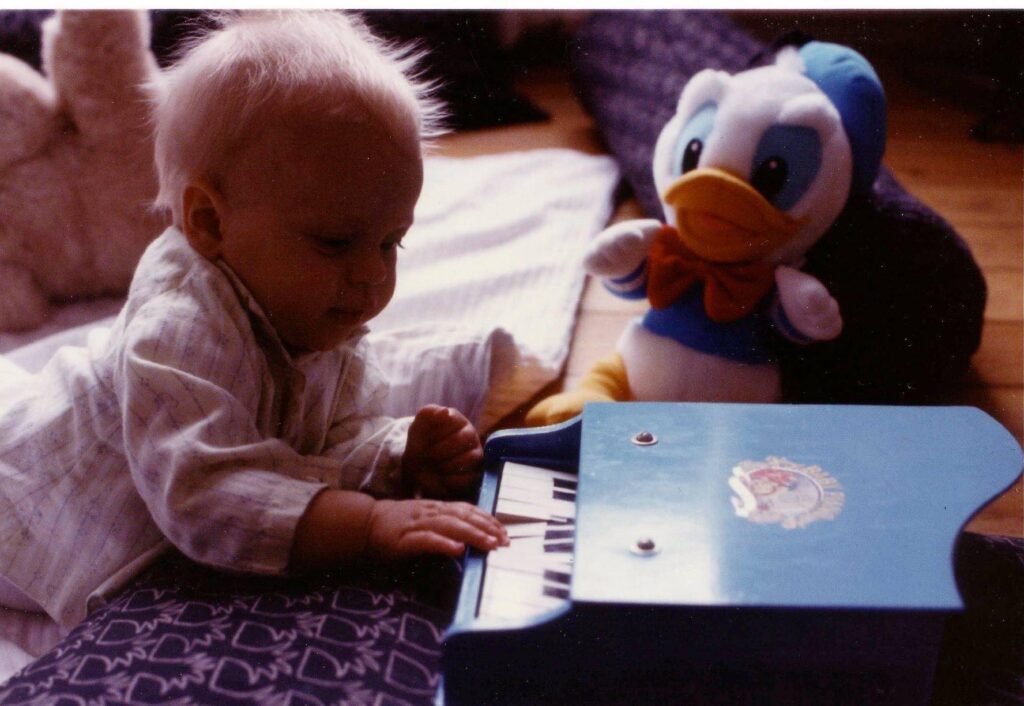 それから、コロナ・パンデミックが始まる直前に、僕らは僕の故郷のブリュッセルに一緒に引っ越しました。どうやら僕らは優れた直感を持っていたようです。
それから、コロナ・パンデミックが始まる直前に、僕らは僕の故郷のブリュッセルに一緒に引っ越しました。どうやら僕らは優れた直感を持っていたようです。
祥子は常にジャズサックスを好みましたが、私は彼女にベルギーの電子音楽(テレックス、マーク・ムーランなど)や日本の80年代シンセポップの先駆者(YMO、細野晴臣、坂本龍一、立花ハジメなど)のサウンドを紹介しました。 on…)、私たちが会った間、私はこれに本当に夢中でした。 したがって、彼女の音楽は、純粋にストレートなジャズから、よりエレクトロニックなポップの方向へ変化しました。私は彼女をパリのレーベル Tiger Sushi に紹介し、彼女のデビュー アルバム『Simple Sentences』を契約することにしました。次の新作アルバムを準備中です (リリース日は 2024 年 10 月を予定)。
JT: ブリュッセルでは彼女と共演する機会も多いのですか?
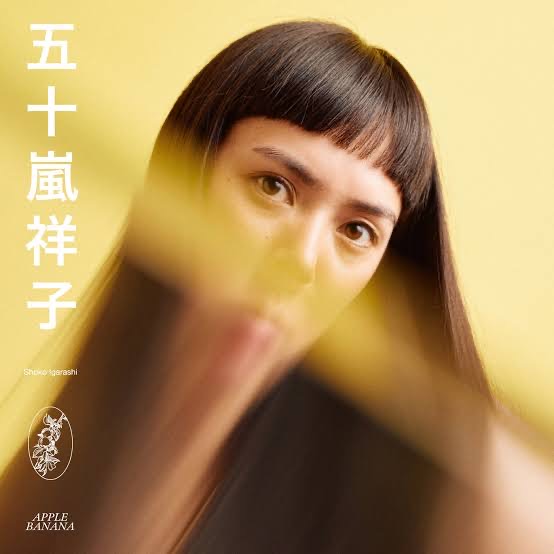 カジミール:ニューヨークに住んでいた頃はデュオのライブを頼まれて、よく一緒にジャズを演奏していました。ベルギーに引っ越してからは、彼女のプロジェクトが軌道に乗り出し、彼女のあらゆるショーでは僕がキーボードを担当していました。最近は僕がまた自分のことで忙しくなったので、彼女は自分の音楽はすべて自分でコントロールし、ライブショーにはビデオアーティストよ共演することになりました。
カジミール:ニューヨークに住んでいた頃はデュオのライブを頼まれて、よく一緒にジャズを演奏していました。ベルギーに引っ越してからは、彼女のプロジェクトが軌道に乗り出し、彼女のあらゆるショーでは僕がキーボードを担当していました。最近は僕がまた自分のことで忙しくなったので、彼女は自分の音楽はすべて自分でコントロールし、ライブショーにはビデオアーティストよ共演することになりました。
近年エレクトロポップの新たな道を歩み始めた祥子ですが、様々な場面でジャズサックスを演奏することをやめたわけではありません。彼女は現在、ドラマーのステファン・ギャラントのバンド(リズム・ハンターズ)に所属しており、彼と一緒にアルバムをレコーディングしています。彼女はブリュッセルの若いジャズシーンに欠かせない存在になったのです。
https://tigersushirecords.bandcamp.com/album/simple-sentences
JT:これまでに何枚のアルバムをリリースしましたか?
カジミール: 7 、8 枚くらいだと思います…。
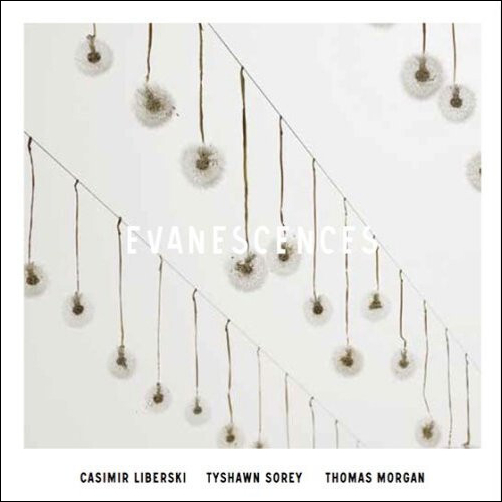 僕が最初にリリースしたアルバムは、2008 年にニューヨークでタイショーン・ソーリーとトーマス・モーガンとで録音した「エヴァネッセンス」(Evanescences)です。その後、2012年に「Atomic Rabbit」と「The Caveless Wolf」があり、これはブルックリンで録音しました。
僕が最初にリリースしたアルバムは、2008 年にニューヨークでタイショーン・ソーリーとトーマス・モーガンとで録音した「エヴァネッセンス」(Evanescences)です。その後、2012年に「Atomic Rabbit」と「The Caveless Wolf」があり、これはブルックリンで録音しました。
CD でリリースされた映画のサウンドトラックがいくつかあり、それらは僕が父のいくつかの長編映画のために作曲し、録音したものです。
最後に、私にとって最大かつ最も野心的なアルバム「コズミック・リバティ」が完成するまでに2、3年かかりましたが、今でも非常に誇りに思っています。これは2017年にブルックリンで、スタードラマーのマット・ガーツカとルイ・ドゥ・ミユールのエレクトリック演奏で録音されました。ベース。このアルバムは現在廃盤になっており、レーベル Rope A Dope が数年後にリリースを中止することを残念ながら決めたため、このアルバムをヴァイナルと CD で再発行したいと考えています。
今年 2024 年にリリースされる新しいトリオの「コンセプト アルバム」が 2 枚あります (ライブ レコード 1 枚とスタジオ レコード 1 枚)。1枚は「ゼルダの伝説」の音楽で、20年前くらいからやりたいと思っていたプロジェクトが、ようやく完成することができたのです。このアルバムは、ジュネーブに拠点を置くレコードレーベルWRWTFWWから発売されます。
JT:これからもライヴ・パフォーマーとして精進し続けるつもりですか?
カジミール:はい、僕は常にライヴ・パフォーマーになることを目指してきましたが、プロデュースしたり、スタジオに入ったり、作曲したり、電子音楽を作ることも大好きです。しかし、繰り返しになりますが、僕の主な焦点は常に、そして今もリアルタイムで人々のために音楽を演奏することです。この経験は何にも代えられません。
JT:日本に自分の居場所は見つかると思いますか?
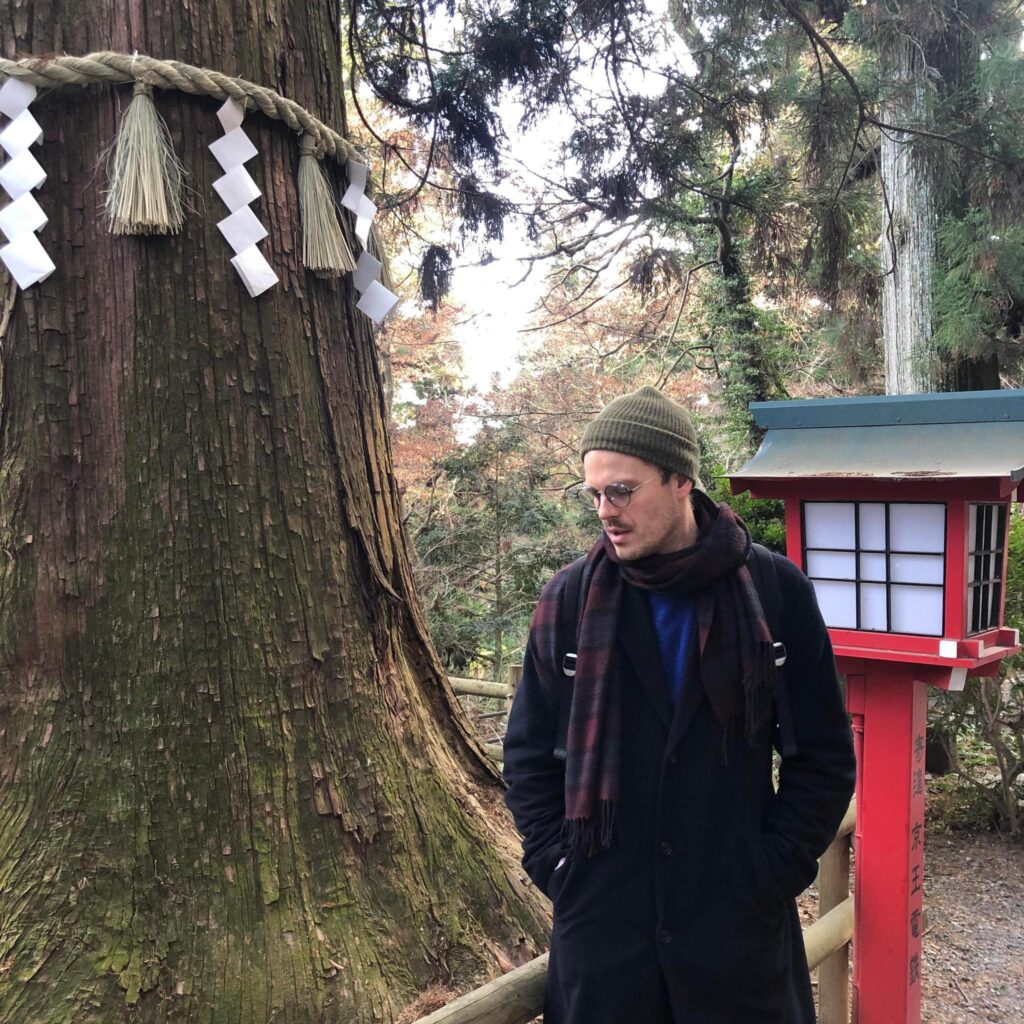 カジミール: そうだといいですね。僕は日本に対して非常に強い親近感を感じています。子供の頃から、ここに住んで演奏するのが僕の夢の場所でした。ここに来ると魔法のようなことが起こります。そうすることでより良いプレイができるようになります。それは、僕ができることや可能であることを知らなかった僕の中の特定のことを解き放ちます。 このエネルギーの流れが僕を利用して僕の中を通過するのを感じます。説明するのは難しいですが、日本にいるときの僕は間違いなく最も幸せで、最も平和な自分です。
カジミール: そうだといいですね。僕は日本に対して非常に強い親近感を感じています。子供の頃から、ここに住んで演奏するのが僕の夢の場所でした。ここに来ると魔法のようなことが起こります。そうすることでより良いプレイができるようになります。それは、僕ができることや可能であることを知らなかった僕の中の特定のことを解き放ちます。 このエネルギーの流れが僕を利用して僕の中を通過するのを感じます。説明するのは難しいですが、日本にいるときの僕は間違いなく最も幸せで、最も平和な自分です。
場所があなたをその人にすることができるとは信じていませんが、場所は間違いなくあなたを形作り、あなたがなりたい人に変えることができます。
ここで演奏するときはいつも、観客やミュージシャンとの深いつながりを感じてきました。まるで僕が本当の自分を理解され、評価され始めたかのようです。そのおかげで、他の場所でよくあるような多くの挫折や自分自身の推測をすることなく、音楽で自分が目指しているものを完全に表現できるようになりました…
JT:ところで、あなたの国にはまだCDショップがありますか?
カジミール: ほとんどありません。 CDはほぼ完全に絶滅しました。一方、レコード盤は再び人気を取り戻ししつつあります。。
JT:フィジカルとデジタルの両方における音楽メディアの将来についてはどう思いますか?
カジミール: 僕は音楽の業界的側面を十分に理解していないので、これについて話す資格はありません。しかし、人々は常にライヴ音楽の体験を求めていると私は確信しています。したがって、音楽が本当に気に入った場合、家に何かを持ち帰るため、つまり思い出を残すために、コンサートでグッズを買う可能性が最も高いでしょう。 彼らが所有できる具体的な何か。
デジタルは間違いなく非常に実用的です。 誰でもすぐに音楽をチェックして、自分に合うかどうかを確認できます。これは音楽にすぐにアクセスできる素晴らしい方法であり、今の時代では絶対に必要です。インターネットが登場する前の時代、ジャケットだけを見てレコードを購入したものの、気に入らなかったことを思い出します。悪い成績を残されているのが愚かだと感じました。今思うと、デジタル消費は音楽の基本的な情報を入手し、良いものと悪いものを選別し、音楽の好みを洗練するためのものであり、これは非常に重要です。物理的な購入とは、大切にしたいものの物理的な表現を収集することです。それはアーティストへの愛とサポートを示す方法です。大好きなレコードの物理的なコピーを所有することほど素晴らしいことはありません。それはたまたま素晴らしいアルバム・ジャケットを持っていたからです。一部の人にとって、それは非常に感傷的な価値のあるオブジェクトになる可能性があります。
だからこそ、ジャケット写真は非常に重要だと思います。 LP は芸術作品になる可能性があります。
パート 3:
Jazz Tokyo:あなたの名前の日本語のスペルはどうなりますか?
カジミール:「カジミール・リベルスキ」だと思います。
JT: あなたは音楽一家に生まれましたか?
カジミール: 専門的に音楽をやっているわけではありませんが、それでも音楽には精通しています。我が家ではいつも良い音楽が流れていました。
JT:差し支えなければ、あなたのご家族の背景を教えていただけますか?
カジミール: 私の父ステファン・リベルスキは映画監督、作家、コメディアンです。私の母、アン・キャサリン・ケニスは美術修復家、陶芸家、彫刻家です。二人とも非常に芸術的な傾向があり、本をよく読む知識人です。僕は進歩的で教養の高い家庭に生まれ、そのおかげで文化的な意識を強く持つことができたことにとても感謝しています。
JT:初めて音楽に興味を示したのはいつ頃ですか?
カジミール: どうやら幼児の頃、僕はセロニアス・モンクの<ナッティ>などのメロディーを歌い返すことで、セロニアス・モンクの音楽に興味を示したようです…。コルトレーンの<カズン・メアリー>もそのひとつでした。私はレイ・チャールズがとても早い段階から大好きでした。
物心ついた頃からずっとジャズが好きでした。
JT:あなたの音楽教育について簡単に教えていただけますか?
カジミール: 繰り返しになりますが、ジャズやその他の音楽の趣味に関しては、両親のおかげだと思います。僕にとって、音楽教育の本質は、幼い頃から音を浴びて音を鳴らすことです。常にさまざまな音楽を聴くことに慣れてください。僕は幸運なことに、キース・ジャレット、ニーノ・ロータ、ブルガリアン・ヴォイスの謎、フランク・ザッパ、ジミ・ヘンドリックス、タラフ・デ・ハイドゥークス、アリ・ファルカ・トゥーレ、ピーター・ガブリエルなどに触れることができました。ほんの数例を挙げると… 音楽は楽しいことや感情や思考の終わりのない探求でした。
僕の最初の愛はビジュアル・アートでした。僕はレコードを聴きながら、数え切れないほど座って執拗に絵を描いていました。ですから、楽器を手にする前から、僕の頭と心はすでに音楽で満たされていました。
ただし、僕はクラシックの訓練を受けていませんでした。最初はほとんど独学で、その後何人かのピアノの先生に教えてもらいましたが、全然ピンと来ませんでした。実は、僕はクラシックピアノのレッスンが大嫌いでした。教師の中には僕のためにそれを台無しにしようとしました、そして僕がクラシック音楽の美しさを僕自身に伝えることができるようにするには、人生のずっと後になってから立ち直らなければなりませんでした。僕の偉大な友人の一人であり英雄の一人であるブラッド・メルドーのおかげです。この古いヨーロッパのクラシック音楽をヒップディグしています。私にとって、クラシック音楽は、退屈、堅苦しさ、憂鬱、さらにはサディスティックであり、子供たちを音楽から遠ざけることを主な動機とする教師の代名詞でした。教師や音楽教育は多くの子供たちにとって本当に嫌な思いをさせる可能性があり、このビジネスは社会に多大な損害を与えています。
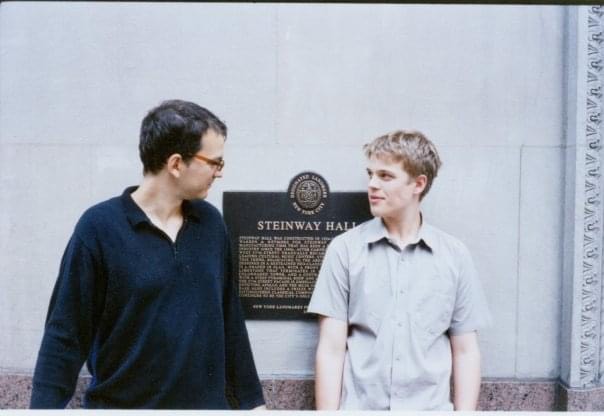
神様のおかげで、僕はこれらの悪い経験をなんとか乗り越え、ヨーロッパの偉大な文化遺産、つまりクラシック音楽のレパートリーの宝庫にアクセスすることができました。しかし、またしても、それは人生の年を経てからでした。それまで僕はもっぱら黒人音楽に興味がありました。
13歳の頃に出会ったブラッド・メルドーのおかげで、彼は僕のピアニストとしての成長の鍵となってくれました。彼はシューベルト、ベートーヴェン、ブラームス、バッハの音楽への愛を遺してくれたのです。
そして高校の終わりに、僕は全額学費(大統領奨学金と呼ばれていました)でバークリー音楽大学に入学することができました。それが僕のアメリカ旅行の始まりであり、人生が変わりました。
JT:プロのミュージシャンとしてデビューしたのはいつですか?
カジミール: 13歳のとき、ブリュッセルのカフェ・セントラルでの初ライヴですね。
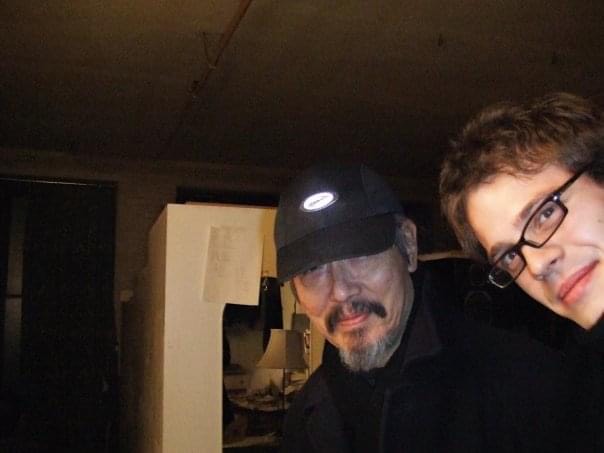
JT:僕の理解では、Pooさんこと菊地雅章さんがあなたのメンターのひとりのようですね。Pooさんとの関係を教えてください。彼があなたの音楽に与えた影響の可能性についても。
カジミール: 15歳くらいのとき、初めて日本を旅行したときに菊地雅章に会いました。僕は「テザード・ムーン」を聴いていて、特にアルバム『エクスペリエンシング・トスカ』が大好きでした。ソロ・ツアー中に東京のクラブに聴きに行きました。ショーはとても魅力的でした。彼が最後に演奏した曲は「夏の最後のバラ」(邦題:<庭の千草>)だったと思いますが、その曲の最中に僕ら全員が小さな地震を感じたのを覚えています。 その後、Pooさんと僕は親しい友人になり、僕は彼の弟子のようなものになりました。彼は、近現代のクラシック音楽を「音楽の宝物」と呼んでおり、その愛を語ってくれました。僕らが出会ったとき、僕はまだブリュッセルの両親と一緒に住んでいました、彼はとても親切で、自分で編集し焼いたCDRの大きな箱を私に郵便で送ってくれました。これらの箱にはシュトックハウゼン、シェーンベルク、ベルク、ウェーベルン、クセナキス、メシアン、クレネック、フェルドマン、ケージ、武満…が入っていたのです。いくつか試聴してみただけで、最終的にはこれらの音楽に情のめり込むようになり、これまで聴いてきたより調性的でモーダルな音楽と同様に喜んで聴くことができるようになりました。その点。それはある意味、僕の音楽的発展における決定的なマイルストーンになったのでした。
僕の音楽教育において間違いなく最も重要な部分、それはオーネット・コールマンを知ることであったことに触れずに続けることはできません。どういうわけか、神はチャーリー・パーカーに続くジャズ界で最も偉大な革命家と出会うことが私にとって有利であると判断したのでしょう。
オーネットとのこの信じられないほどの友情と指導については一冊の本を書くことができますが、今は星が揃って、幼い頃から彼に会って一緒に遊び、長い時間を過ごすことができたとだけ言っておきます。彼とはジャム・セッションをしたり、話したり、一緒に過ごしたりするのに多くの時間を費やしました。オーネットは、私を今日のアーティストにしてくれた僕の人生における決定的な力でした。オーネットがいなかったら、僕の人生は何も変わっていなかっただろうと思います。
彼のおかげで、僕はチャーネット・モフェット、ジェフ・テイン・ワッツ、スタンリー・ジョーダン、デナード・コールマン、ジェームス・ブラッド・ウルマーらとレコーディングやツアーをすることができたのですから…
JT:これまでに経験した最も重要な音楽イベントは何ですか?
カジミール:2015年にチャーネット・モフェットと行ったツアーは、間違いなくこれまでの僕のキャリアの最高点のひとつだったと思います。また、僕は最近、2024年1月のブリュッセル・ジャズ・フェスティバルのアーティスト・イン・レジデンスを務めました。フラジーの非常に大きなホールでのコンサートに特別ゲストとしてグレッグ・オズビー、ラリー・グレナディア、ナシート・ウェイツを迎えることができたことを光栄に思います。
また、僕が父のために書いたすべての映画音楽は、弦楽四重奏のために作曲することになったので、素晴らしい学習体験であったことにも触れておきたいと思います。今年、父の新作映画「The Art of Nothing」のために私が行った仕事は、ピアノ曲を強化するために多くの電子機器を使用したので、それも素晴らしかったです。
吉田達也とのこの日本ツアーも、私の音楽の旅の中で最も重要な経験になることを願っています。
JT:最後にあなたの夢を教えてください。
カジミール: 僕の夢は、今していることをやり続けることです。自由であることを意味します。僕たちが置かれている世界の状況を考えると、僕はアーティストとしても人間としてもできる限り自由です。アートや音楽は抵抗の一種だと僕は信じています。真の芸術は、僕たちが日々摂取しているあらゆる毒物とは逆流であるため、ある意味アナーキストでなければなりません。僕が選んだこの音楽生活は、主流に反し、依然として大衆産業に立ち向かい、人間生活のあらゆる側面に浸透したシステムである資本主義という貪欲な癌に立ち向かうものです。僕は、愛、希望、真実がまだ存在する人類の未来を夢見ています。
JT:どうもありがとうございました!クラブでの演奏を楽しみにしています。
Part 1:Upcoming tour
Part 2:Activities
Part 3:History
Part 1:
JazzTokyo: Is this your first Japan tour?
Casimir Liberski:
Officially, it is. I’ve played small gigs here and there in Tokyo on my previous trips but never at such a high cadence as this upcoming tour.
JT:How many gigs are organized this time?
Casimir: I think about 25, if I’m not mistaken.
JT:How was the tour organized?
Casimir: Tatsuya Yoshida organized the whole tour for our duo and I’m very grateful for his efforts.
JT:How were guests chosen?
Casimir: Tatsuya contacted them, I also suggested some musicians I met and whose work I admire. For instance, the double bassist Takashi Sugawa and I have known each other for a long time and played together many times. I had introduced him to my late friend and mentor Masabumi Kikuchi who later became Takashi’s mentor as well back when we were living in the US.
I met Otomo Yoshihide for the first time in Brussels during his latest tour and always wanted to play him, so I’m gonna be in for a treat. .
JT:You will play keyboards (synthesizer) in addition to piano. Which instrument do you bring this time?
Casimir: I couldn’t bring any of my larger boards obviously, due to traveling. So I decided to take the new Synclavier Regen with me, which is a desktop synth that contains infinite sounds. It is the latest generation of the famous New England Electronics’ Synclavier which was used by Frank Zappa, Michael Jackson, and many more, which combines a wide variety of synthesis. I’m actually super excited about diving into this powerhouse of a machine.
JT:You guys are expected to play tunes in addition to impro.s. Both of you will bring tunes respectively?
Casimir: So far the duo has only been playing totally improvised shows but we had plans to also play compositions. I have written a lot of tunes that I’ve never recorded or played for people. Therefore, Tatsuya took the time to select a few of them that he thinks would fit best for us. I would love to play Tatsuya’s music as well eventually, (as he is one hell of a composer), but we already have a lot of material to choose from.
JT:How did you know Tatsuya?
Casimir: I knew of Tatsuya from his legendary band Ruins of course. I was already a fan when I was a teenager. I remember walking into middle school with Ruins CD’s playing on my walkman. I thought that music was the perfect combination of punk rock, the complexity of prog and jazz and the experimental music that I liked.. Later, I found out he was on Facebook so I simply added him and contacted him to organize a show in Brussels with SaxRuins in 2016 (his duo with alto saxophonist Ryoko Ono), and I opened for them, then sat in at the end of their set. We kept sending music back and forth during Covid, and finally made a duo show in February 2023 at Bar Thelonious in Tokyo, which Tatsuya recorded, and later became the “Troubled Water” album released on the Brussels-based record label “Totalism”.
JT:How did the album Troubled Water come out?
Casimir: I thought the performance on this gig was very special, like something quite magical had happened that night in the energy and inventiveness of our playing. So I decided to send it to John Zorn who recommended that we have it be mixed by James Dellacotoma who mixed Tzadik records and who also often mixed Bill Laswell’s live recordings.
James did an amazing job bringing the rawness of the live sound and making it into something pretty original and beautiful. Then back in Brussels, I had just met the guys from Totalism who were just starting out this new label, as initially they were mostly a publishing company who happened to put out my father’s most recent novels.
These guys are so dynamic and they did an amazing job on the design and communicating about the project to press (The Wire, Pitchfork, Record Makers, etc).
JT:Where CDs and vinyls were manufactured?
Casimir: I think Belgium or Holland. The graphic designers are based in Berlin.
The cover art is paintings by Belgian artist Pascal Bernier, who’s a friend of mine.
JT:Can we buy the album digitally via Bandcamp, too?
Casimir:Yes. The LP is also available on all streaming platforms. The CD “Mizu, Tagiru” has a whole other tracklist than on the vinyl “Troubled Water” because we had mixed and mastered the whole show which came up to about two hours of music and I wanted to share everything on different formats.
As of now, the “Mizu, Tagiru” is only available on CD, after the shows during this Japanese tour and will be officially available on sale and online in September.
Part 2:
JazzTokyo:What is your dominant instrument these days?
Casimir: Piano, and I hope it will always be for as long as I breathe.
JT:Piano and various keyboards/synthesizers are set up at your home?
Casimir: Yes, I’m fortunate to currently have a nice home studio in Brussels with my Yamaha baby grand piano, my mixing board and all my synthesizers (Prophet 10, the MiniMoog, DX7, 3rd Wave, OBX8… and more).
JT:Where is your dominant place to perform in your country?
Casimir: I’d say Brussels because I’m living there at the moment and it’s the capital but I’m not nearly playing as much as I would like to. That’s because there aren’t nearly enough places to play the kind of music I do in Belgium…Also, there is a saying in French “no-one is a prophet in his/her land”… My dream would be to come a lot more regularly in Japan and even relocate here eventually. Although my ultimate goal is to work with an international booking agency, that can help me tour all over the world as much as possible.
JT:Who do you play with usually?
Casimir: Unfortunately, I don’t have specific people whom I play with on a very regular basis. I tend to switch bands a lot. In general I’d say I live more within the jazz/improvised music community, although I’ve never really felt part of any specific scene. I like to remain flexible and be able to play with anybody all across the board. I strongly stand against musical snobbery.
JT:Please introduce your wife Shoko Igarashi briefly.
Casimir:Shoko Igarashi was born in Tsuruoka, Yamagata. She moved to Tokyo to attend Senzoku music high school when she was about 15, then went to Berklee College of Music as a tenor saxophone student. We hadn’t met during her college days, as I had already graduated by the time she entered the school.. After her graduation, she moved to New York where I had been living for a few years already. That’s where we met.
Then we moved together to my hometown of Brussels, right before Covid started. We had a good instinct apparently.
Shoko had always been geared towards jazz saxophone but I introduced her to the sound of Belgian electronic music (such as Telex, Marc Moulin) and also the pioneers of Japanese 80’s synth pop (YMO, Haruomi Hosono, Ryuichi Sakamoto, Hajime Tachibana, and so on…), which I was really into during the time we met. Therefore her music took a turn from the purely straight-ahead jazz to a more electronic pop direction. I introduced her to the Parisian label Tiger Sushi who decided to sign her debut album, “Simple Sentences”. Then the rest is history and another album is on the way (release date October 2024).
JT:Do you guys play together down there?
Casimir:We used to play jazz together when we lived in New York, as we were often asked to play duo gigs in the city. When we moved to Belgium, I was backing her on keyboard on all her shows as her project was taking off. Then lately, I got more busy with my own stuff again, and she decided to deal with the music all by herself and bring in a video artist for the live shows.
Although Shoko had taken a new path in electronic pop in recent years, she has never stopped playing jazz saxophone on various occasions. She is currently in drummer Stephane Gallant’s band (The Rhythm Hunters) and recorded an album with him. She is an intrinsic part of the young Jazz scene in Brussels.
JT:How many albums have you released so far?
Casimir: About 7 or 8 I think…
My first released album was “Evanescences”, recorded in 2008 in New York, with Tyshawn Sorey and Thomas Morgan. After that there was “Atomic Rabbit” and “The Caveless Wolf” in 2012, also recorded in Brooklyn.
There were a few movie soundtracks that were released on CD, which I composed and recorded for a few of my father’s feature films.
Finally my biggest and most ambitious album “Cosmic Liberty” which I’m still very proud of, which took me a good 2 or 3 years to complete, was recorded in 2017 in Brooklyn, with star drummer Matt Gartska and Louis De Mieulle on electric bass. I’m looking to reissue this album on vinyl and CD as it’s now out of print and the label Rope A Dope, decided to drop it after a couple years unfortunately.
I have a couple of new trio “concept albums” that are going to come out this year 2024 (one live and one studio record), playing the music of “The Legend of Zelda”. This is a project I’ve been meaning to do for about 20 years, and finally came to finish it. It will come out on the Geneva-based record label WRWTFWW.
JT:Do you intend to develop yourself as a live performer or?
Casimir: Yes. I’ve always aimed at being a performing musician, although I love producing, being in the studio, composing, and making electronic music. But again, my main focus has always been and still remains playing music for people in real time. This experience cannot be replaced.
JT:Do you think you can find your place in Japan?
Casimir: I hope so. I feel a very strong affinity with Japan. It has always been my dream place to live and perform, ever since I was a kid. There is something magical that happens when I come here. It makes me play better. It unlocks certain things in me that I didn’t know I could do or were possible. I feel this energy flow that I can tap into and goes through me. It’s hard to explain, but I’m certainly the happiest, most peaceful self when I’m in Japan.
I don’t believe that a place can make you who you are, but it can definitely shape you, transform you into someone you want to be.
Whenever I’ve played here, I’ve always felt a deep connection with the audience and the musicians. It’s as though I finally was being understood and appreciated for who I really am, which allows me to fully express what I’m going for in music without as many setbacks or second guessing myself as I usually have elsewhere…
JT:By the way, do they still have CD shops in your country?
Casimir: Almost none. CD is nearly completely extinct. On the other hand, vinyls are one rise again.
JT:What do you think about the future of musical media both in physical and digital?
Casimir: I’m not really qualified to speak about this as I’m not fully aware of the industry aspect of music. But I’m pretty sure that people will always seek the experience of live music.Therefore, they will most likely buy merchandise at the concert when they really like the music just to bring something back home with them, in other words to keep a memory, something tangible they can hold on to.
Digital is without question very practical; as anyone can quickly check out the music, see if it’s for them or not. It’s a great way to have quick access to music, and that’s absolutely necessary in this day and age. I remember the days before the internet when you bought a record just based on the cover, and you didn’t like it. I felt stupid being stuck with a bad record. I think now, digital consumption is for getting the basic information of music, filtering the good from the bad stuff, refining your taste in your music, which is very important. Physical purchase is to collect a physical manifestation of something you want to cherish. It’s a way of showing love and support for an artist. There is nothing like owning a physical copy of a record you absolutely love, which happens to have a killer album cover. It can be an extremely object of great sentimental value for some.
That’s why I think the cover art is so crucial. An LP can be a piece of art.
Part 3:
Jazz Tokyo:How is your name correctly spelled in Japanese?
Casimir: カジミール・リベルスキ
JT: Were you born under a musical family?
Casimir: Not professionally musical but well versed in music nonetheless. We have always had good music playing in the house.
JT:Could you tell us the background of your family, if you don’t mind?
Casimir: My father Stefan Liberski is a film director, writer and comedian. MY mother Anne-Catherine Kenis, is an art restore, ceramist and sculptor. Both are very artistically inclined and well read intellectuals. I’m very grateful I was born in a progressive, highly cultivated family which gave me a strong cultural awareness.
JT:When did you show interest in music first?
Casimir: Apparently as a toddler I showed interest in the music of Thelonious Monk by singing back some of his melodies like “Nutty”… “Cousin Mary” by Coltrane was also one. I loved Ray Charles very early on.
I’ve always been into jazz, ever since I can recall.
JT:Could you tell us the story of your musical education briefly?
Casimir: I think, again, I owe my parents a great deal for my taste in jazz and other music. For me the essential of any musical education is to be bathed in and sound from an early age. Getting used to hearing a lot of different music always. I was lucky enough to be exposed to Keith Jarrett, Nino Rota, The Mystery of Bulgarian Voices, Frank Zappa, Jimi Hendrix, Taraf de Haidouks, Ali Farka Touré, Peter Gabriel, just to name a few… Music was an endless exploration of joyful feelings and thoughts..
My first love was visual art. I used to sit for countless hours relentlessly drawing while listening to records. So my head and soul were already filled with music, before I started getting my hands on an instrument.
I was not classically trained though. I was pretty much self-taught at the very beginning, then got a few different piano teachers but it never really clicked. In fact, I used to hate classical piano lessons. Some teachers almost ruined it for me, and I had to come around much later in life to be able to let the beauty of classical music get to me, thanks to one of my greatest friends and hero, Brad Mehldau, who somehow managed to make it hip digging this old European classical music. For me, classical music was a synonym of boredom, rigidity, depressing, even sadistic and teachers whose primary motive were to make kids run away from the music. Teachers and musical education can be a real turn off for so many kids, and this business has caused great damage in society.
Thank God, I managed to pass these bad experiences and allow myself to access the wealth of great European cultural heritage, that is the classical music repertoire. But again, that was later in life. Up until then, I was solely into Black music.
Thanks to Brad Mehldau whom I had met around the age of 13 and he was key in my development as a pianist. He bequeathed the love for the music of Schubert, Beethoven, Brahms, and Bach.
Then right at the end of highschool I got accepted into Berklee College of Music, on a full ride (they called it the Presidential Scholarship) covering all of my expenses. That was the beginning of my US journey, which was life changing.
JT:When did you make your debut as a professional musician?
Casimir: First gig at 13 years old at Café Central in Brussels.
JT:Masabumi Poo Kikuchi seems your mentor if I understand adequately. Please let us know your relationship with Poo incl. his possible influence over your music.
Casimir:When I was about 15 I met Masabumi Kikuchi during my first trip to Japan. I had been listening to Tethered Moon and especially loved the “Experiencing Tosca” album. I went to hear him in a club in Tokyo while I was on a solo tour. The show was mesmerizing. I remember we all felt a small earthquake during the last song that he played which I believe was an Irish folk song called “The Last Rose of Summer ”. Later, Poo and I became close friends and I became sort of his disciple. He shared his love for modern and contemporary classical music which he called his “musical treasures”. I was still living with my parents in Brussels when we met, and he had the good heart to send me by mail some big boxes of burned CDS compiled by himself.. These boxes contained pieces by Stockhausen, Schoenberg, Berg, Webern, Xenakis, Messiaen, Krenek, Feldman, Cage, Takemitsu… I took a few attempts at them but I eventually became passionate about this music, and could listen to it with as much pleasure as I could the more tonal and modal music I had listened to up to that point. That in a way was a definite milestone in my musical development.
JT:Who are your favorite or influential musicians besides Poo?
Casimir:I can’t go on without mentioning what is without a doubt the most important part of my musical upbringing, which was knowing Ornette Coleman. Somehow the gods had decided that it would be advantageous for me to cross paths with the greatest revolutionary in Jazz after Charlie Parker.
I could write a whole book on this incredible friendship/mentorship I had with Ornette, but for now I will just say that the stars were aligned so that I got to meet him and play with him at a very early age and got to spend a great deal of time jamming, talking, and just hanging out with him. Ornette was the decisive force in my life who made me into the artist that I am today. Nothing would have been the same without Ornette in my life.
Because of him, I got to record and tour with Charnett Moffet, Jeff Tain Watts, Stanley Jordan, Denardo Coleman, James Blood Ulmer…
JT:What is the most significant musical event you have experienced so far?
Casimir:I guess that tour I did with Charnett Moffet in 2015, was definitely one of the high points of my career so far.. Also, I recently was the artist in residence for the Brussels Jazz Festival in January of 2024, and had the honor to bring in Greg Osby, Larry Grenadier, and Nasheet Waits as special guests for a concert in the very large hall of Flagey.
I’d also like to mention all the movie scores that I did for my father were incredible learning experiences, as I got to write for a string quartet., The work I did this year for his upcoming film “The Art of Nothing”, was great too because I used a lot of electronics to enhance my piano compositions.
I’m hoping that this Japan tour with Yoshida Tatsuya will also be the most significant experience of my musical journey.
JT:Finally, please tell us your dream.
Casimir: My dream is to keep doing what I do. Meaning being free. As free of an artist and human as I can be, given the state of the world that we’re in. I believe that Art and music is a form of resistance. True Art has to be anarchist in a way, as it is countercurrent to all the poisons we are being fed daily. This life of music that I’ve chosen goes against the mainstream, it still stands against the mass industry, tackles the voracious cancer that is capitalism which system has infiltrated every aspect of human life. I dream of a future for humanity where there is still a place for love, hope, and truth.
JT:Thank you so much!
Looking forward to listening to your music at clubs.

